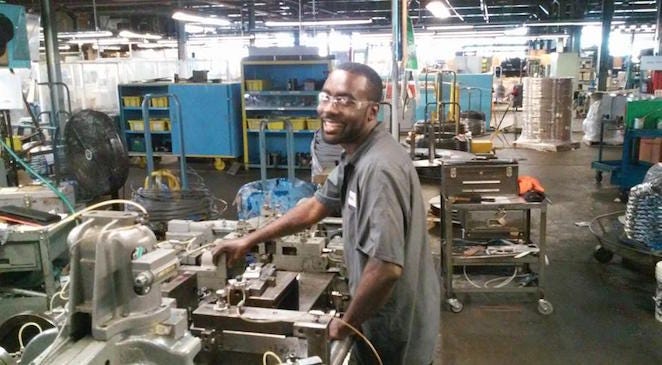Chicago-Based Nonprofit Connects Companies in Need of Buyers with Network of Aspiring Business Owners

By Anne Field
In greater Chicago, most owners of manufacturing companies are white, close to retirement age, and in need of a succession plan. Typically, their children don’t want to take over or they lack the skills to do so. The likeliest fate for those businesses is to be bought by private equity firms that fire the employees, sell off some assets and move on, meaning a loss of jobs and revenue in the region.
For Dan Swinney, founder of the 35-year-old Manufacturing Renaissance, a nonprofit aimed at reviving manufacturing in the Chicago area, this challenge creates opportunity—especially for black, Latino and Latina entrepreneurs, who might be employees of the business or people interested in owning and running an existing company. With a group of like-minded partners, Swinney wants to identify thousands of healthy companies in need of buyers while building a pipeline of viable, potential purchasers.
By matching businesses with prospective buyers, Swinney aims to preserve manufacturing companies and jobs while boosting entrepreneurial opportunities for people of color.
“This crisis seemed like a great opportunity,” says Swinney, who is managing director of the project. “This is a way to keep industry here and do something about the virtual exclusion of black, Latino and Latina entrepreneurs from manufacturing.”
With that in mind, he recently helped form the Ownership Conversion Project (OCP), in collaboration with a long list of partners, including Safer Foundation, the Chicago Federation of Labor, LISC Chicago, World Business Chicago, the Cook County Bureau of Economic Development and the Illinois State Treasurer’s Office.
A Concept with Legs
A little more about the numbers: In Illinois, about 99% of manufacturing companies are white-owned, according to Manufacturing Renaissance. At the same time, 73% of the manufacturing companies in the Chicagoland area have an owner over the age of 55, according to study by UIC Great Cities Institute. And 61% have not chosen a suitable successor.
Swinney first made a stab at this approach in the late 1980s. At that time, he created a for-profit subsidiary, which made “seven or eight acquisitions,” he says. Ultimately, however, it didn’t have enough capital to keep going and he closed down the project. More recently, he realized the concept still had legs—as long as he could team with enough partners. Thus, the OCP was formed. (The name will soon be changed, according to Swinney.) The focus is on smaller companies, which are most in need of help.
The so-called “silver tsunami” of baby boomers nearing retirement has prompted other efforts, such as a new fund by the Evergreen Cooperatives in Cleveland, that emphasize transferring ownership to groups of employees who form worker-owned cooperatives.
Two-Part Process
For OCP, there are two parts to the puzzle. The first is identifying potential sellers. Some of that intelligence will come from union representatives, who know which of the companies they represent have owners close to retirement age with no successor in sight.
The other is finding buyers. The first avenue will be to approach employees who might be interested in purchasing the company. If no employees are interested, OCP will turn to a pool of interested buyers who are people of color, some of whom will be identified by partners with access to a broad network of contacts.
If that doesn’t provide a viable purchaser, Swinney says, “we’ll work with any entrepreneur committed to keeping the company here. Each of these companies may employ 10 or 50 people. But in aggregate, they represent the lifeblood of the manufacturing sector.”
The group also will work to prepare employees to take over the business and secure funding.
Seizing the Opportunities
The OCP is not the only Manufacturing Renaissance initiative. The Chicagoland Manufacturing Renaissance Council (CMRC) is a public-private partnership of manufacturing companies, consultants, labor unions, nonprofits, government, educators and community and economic development leaders focused on the key role that manufacturing plays in building a strong, sustainable society.
And there’s Manufacturing Connect (MC), which provides training in manufacturing jobs and has three initiatives: a high school-based training program, a project for alumni and young adults who can act as mentors, and a program training instructors how to be both culturally and pedagogically competent.
Swinney and his partners launched a $1 million fundraising campaign that will allow them to hire full-time staff for OCP. But there is urgency around the effort. “This opportunity will be available for the next 10 years or so,” he says. “After that, a lot of these companies will be gone.”
This article was also published by Locavesting. B the Change gathers and shares the voices from within the movement of people using business as a force for good and the community of Certified B Corporations. The opinions expressed do not necessarily reflect those of the nonprofit B Lab.

When An Entrepreneur Opportunity Helps Save Manufacturing Jobs was originally published in B the Change on Medium, where people are continuing the conversation by highlighting and responding to this story.